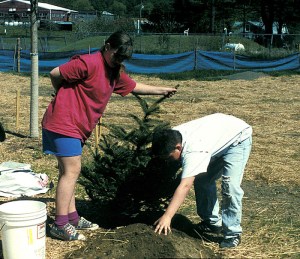
CONCORD, NH – Are you an educator with an idea for a project that involves students in enhancing their schoolyard for wildlife habitat, connects them with the outdoors, and integrates nature into learning that aligns with curricula? Whether remotely or from the classroom, has the COVID-19 public health emergency made you think about how to get your students learning outside more? The New Hampshire Partnership for Schoolyard Action is now accepting grant applications for schools with students from pre-kindergarten through grade twelve to help fund nature-based learning projects.
Schoolyard Action Grant applications are being accepted through January 29, 2021. Grants of $500 up to $2,000 will be awarded to top applicants. For more information and a grant application, visit https://wildlife.state.nh.us/education/grants.html.
The U.S. Fish and Wildlife Service New England Field Office, New Hampshire Project Learning Tree, the New Hampshire Fish and Game Department, and New Hampshire Audubon have partnered to support Granite State schools through the New Hampshire Partnership for Schoolyard Action Grants. This partnership was created to make it easier for educators to apply for a grant to enhance their schoolyards to support nature-based studies. The common grant application works for all four of the partner organizations and greatly simplifies the application process.
Students of all grade levels benefit from learning outdoors. Some examples of projects that have been funded by the partner organizations in the past include the establishment of pollinator gardens, the creation of outdoor learning areas, installing solar-powered bird baths, and replanting of school grounds with native plants that enhance wildlife habitat. Other types of projects eligible for support include trail or pond creation, citizen science activities, and bird feeding or watering stations.
Projects or items not eligible for funding include vegetable gardens, staff time, field trips, school grounds landscaping, or purchase of educational supplies unless they are directly related to the project.
Both student and community involvement in planning and on-site work is strongly encouraged. Professional consultation is available for project planning. The Partnership Team will be available throughout the entire process to help schools implement their projects.







